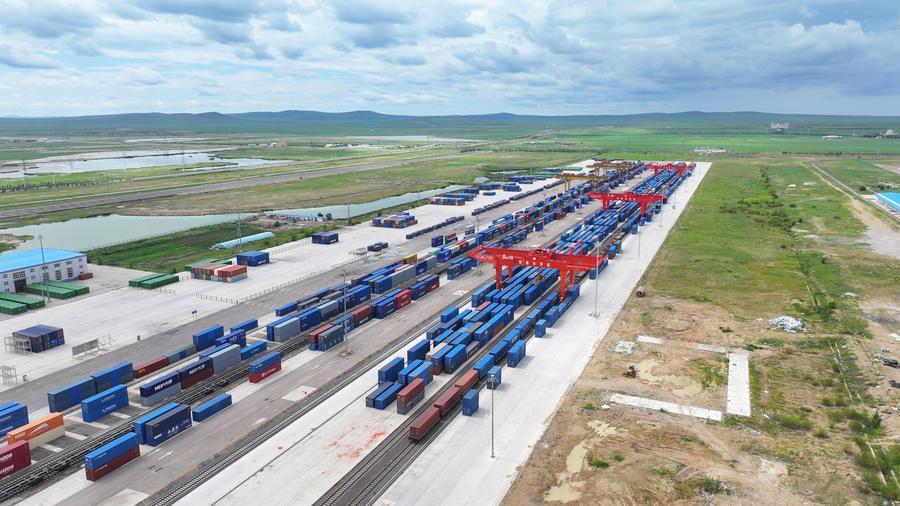An aerial drone photo shows containers being loaded at Manzhouli Railway Port in north China's Inner Mongolia Autonomous Region, Aug. 6, 2024. (Photo by Huang Xu/Xinhua)
HOHHOT, May 15 (Xinhua) -- In the quiet hours of the morning, freight trains rumbled through Manzhouli, carrying a steady flow of agricultural products and timber from Russia to this border city in north China's Inner Mongolia Autonomous Region.
As China's largest land port, Manzhouli is expanding beyond its traditional role as a "transit station." By promoting local processing of grain, oil and timber, the city is steadily evolving into a regional industrial hub.
At Manzhouli Xinfeng Grain and Oil Industry Co., Ltd., freshly imported rapeseed from Russia is processed on intelligent production lines. From dehulling to pressing, the procedures run smoothly, as golden rapeseed oil gently streams into storage tanks.
"As soon as the raw materials clear customs, we go straight into production, operating around the clock," said Yang Zhihong, deputy general manager of the company. He noted that Russian rapeseed oil, prized for its low acid value and high smoke point, is particularly popular among domestic downstream enterprises.
This "Russian supply, Chinese processing" model is fueling a growing shift among local businesses, pushing them beyond mere trade toward more advanced, value-added processing.
Yang crunched the numbers. "By importing raw materials through 'border trade', a special policy that allows residents in border areas to conduct small-scale cross-border trade under simplified customs procedures, we save an average of 500 yuan (about 69.5 U.S. dollars) per tonne. Since last year, that's added up to savings of over 8 million yuan," he explained.
This model cuts traditional trade taxes and fees from around 18 percent to less than 4 percent of total costs. It enables enterprises to source raw materials at lower prices, while border residents earn income from the price difference, creating a win-win supply chain involving border residents, cooperatives and enterprises.
As of April 2025, "border trade" in Manzhouli has surpassed 100 million yuan this year, with more than 3,600 border residents taking part, generating nearly 2 million yuan in tax revenue to the city.
The roaring development of Manzhouli's timber processing industry goes hand in hand with the grain and oil sector. Since establishing an imported timber processing base in 2003, Manzhouli has continuously focused on deep and fine processing, showcasing the strong potential of its timber manufacturing industry.
Located in the Inner Mongolia Manzhouli border economic cooperation zone, the import-export resource processing industrial park processes up to 5.6 million cubic meters of timber annually. It has developed a diverse product lineup, including solid wood furniture, doors and windows, wood pellets, and solid wood flooring.
In 2023, the city's timber import reached 1.88 million cubic meters, demonstrating the strong momentum of the industry's growth.
Meanwhile, Manzhouli has planned the development of a 2.74-square-kilometer chemical industry cluster within the import-export resource processing industrial park. This cluster will primarily rely on the import of large quantities of liquefied petroleum gas, methanol, and alkanes from Russia to drive integrated new energy chemical utilization and related projects.
The cluster will provide high-end, premium chemical intermediates for domestic advanced polymer materials and engineering plastics, injecting new momentum into the city's economic development.
Bai Zhiping, an official from the Manzhouli municipal commerce bureau, said that Manzhouli's transformation from a "transit station" to an "industrial hub" reflects the development of the port-based processing model.
An increasing number of enterprises are moving beyond the traditional "transit economy" and are leveraging the advantages of the border to create a new industrial ecosystem focused on deep processing.
In the first quarter of this year, Manzhouli's import and export freight volume reached 6.53 million tonnes, a year-on-year increase of 10.6 percent. The value of imports and exports handled by the Manzhouli port reached 47.67 billion yuan, up 6.1 percent year on year.




 A single purchase
A single purchase









